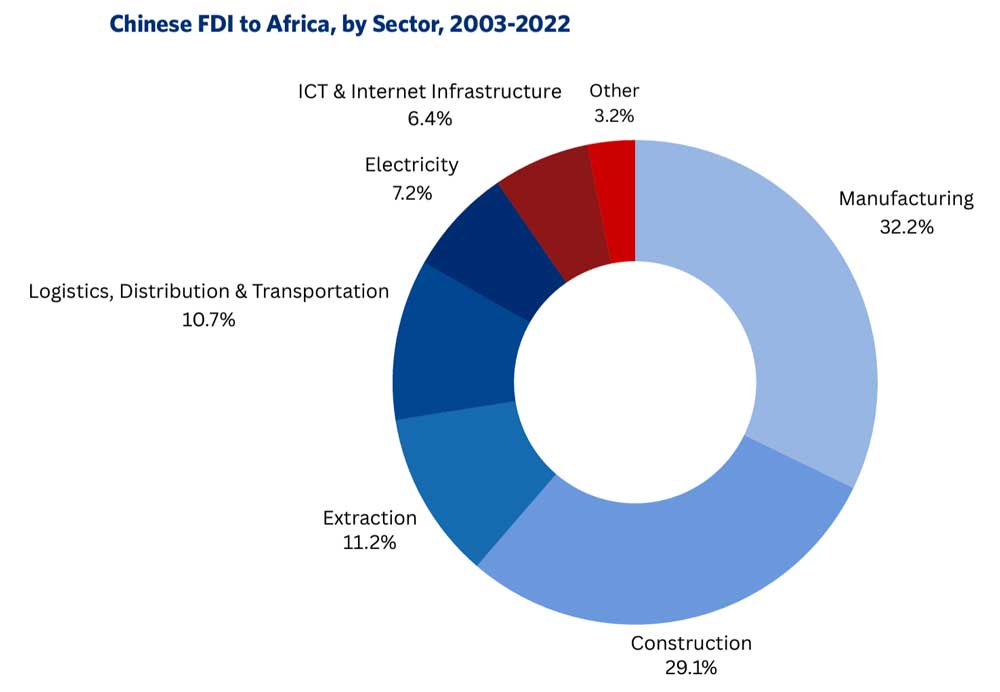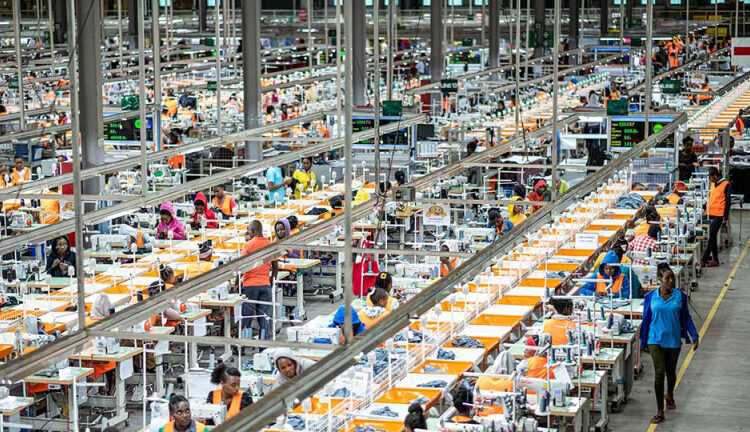By Keyi Tang, Solomon Owusu and Gideon Ndubuisi
As African and Chinese leaders prepare for the upcoming Forum on China-Africa Cooperation (FOCAC), it is imperative to consider the environmental implications of China’s growing economic presence in Africa.
Our new working paper published by the Boston University Global Development Policy Center reveals that Chinese foreign direct investment (FDI) is contributing to increased industrial carbon emissions in Africa, highlighting the urgent need for sustainable development strategies.
By analyzing Chinese FDI in 34 African countries from 2003-2014, our research reveals that the emissions increase is particularly pronounced in labor-intensive and resource-intensive sectors, which have been the primary focus of Chinese investment in Africa. Conversely, investments in knowledge-intensive manufacturing sectors showed no significant increase in emissions, suggesting that investments in the latter have the potential to support more sustainable industrialization in Africa, pointing to a potential pathway for sustainable industrialization. These findings are particularly relevant as global pressure to address climate change intensifies, potentially exposing African economies reliant on high-emission industries to future economic risks and trade barriers.
As the FOCAC approaches, African governments should prioritize incentivizing Chinese investors to channel investment into high-tech and innovative industries. Implementing tax breaks for green technologies and supporting research and development in low-emission industries can attract investments that are aligned with the United Nations 2030 Sustainable Development Goals (SDGs). This strategic shift is crucial for reducing the carbon footprint of industrial activities and promoting a green industrial future across the continent.
Our research also highlighted a stark contrast between FDI from China and FDI from countries within the Organization for Economic Co-operation and Development (OECD). Despite similar concentrations in resource-intensive sectors, OECD country investments did not show a statistically significant increase in emissions. This discrepancy underscores the need for stronger implementation of environmental, social and governance (ESG) standards in Chinese-funded projects.

During the FOCAC, African policymakers should push for the alignment of Chinese ESG standards with international norms. This could involve adopting guidelines similar to those of the OECD and ensuring their rigorous implementation in all Chinese-funded projects. Promoting transparency and accountability in ESG practices will help mitigate the environmental impact of Chinese FDI and support sustainable industrialization.
Finally, our study also highlights the pivotal role of environmental regulations in moderating potential negative impacts of foreign investments. However, many African countries struggle with weak enforcement of these regulations, undermining their effectiveness. This regulatory gap allows environmentally harmful practices to proliferate, exacerbating the region’s carbon emissions.
The FOCAC provides an opportune platform for African nations to negotiate stronger environmental safeguards with China. By enhancing regulatory frameworks and ensuring stringent enforcement, African countries can mitigate the adverse environmental impacts of Chinese FDI. This could involve adopting international best practices for environmental governance and establishing independent monitoring bodies to oversee compliance.
China, for its part, can leverage its recent emphasis on greening the Belt and Road Initiative (BRI) to improve the sustainability of its African investments. As China seeks to burnish its credentials as a responsible global leader, particularly in the realm of climate action, the FOCAC presents an opportunity to demonstrate this commitment concretely. By working together to promote green industrialization in Africa, China and its African partners can set a new standard for South-South cooperation in the age of climate change.
African policymakers, in particular, must seize this moment to advocate for investment that aligns with their countries’ domestic sustainable development goals. While this may require difficult conversations about short-term trade-offs between rapid industrialization and environmental protection, it is essential for securing a prosperous, sustainable and a more resilient future.
As the FOCAC convenes, the decisions made will shape the trajectory of Africa’s industrial development for years to come. By prioritizing investments in knowledge-intensive, low-carbon sectors and implementing robust environmental safeguards, African nations and China can forge a partnership that balances economic growth with environmental stewardship. This approach not only addresses the pressing challenge of climate change but positions Africa at the forefront of the global green economy, setting a powerful example for sustainable development in the Global South.
Keyi Tang is a former Global China Postdoctoral Research Fellow with the Boston University Global Development Policy Center and an incoming tenure-track Assistant Professor at the ESADE Business School in Barcelona. Follow her on X: @KeyiTang1.
Solomon Owusu is a Core Faculty Member of the Global China Initiative at the Boston University Global Development Policy Center and an Assistant Professor of Global Development Policy at the Frederick S. Pardee School of Global Studies at Boston University. Follow him on X: @S_KOwusu.
Gideon Ndubuisi is an Assistant Professor of Economics at Delft University of Technology (TU Delft). Prior to joining TU Delft, he worked and consulted for institutions such as the United Nations Industrial Development Organization, World Bank, African Development Bank, European Commission and International Finance Corporation, among others.
















